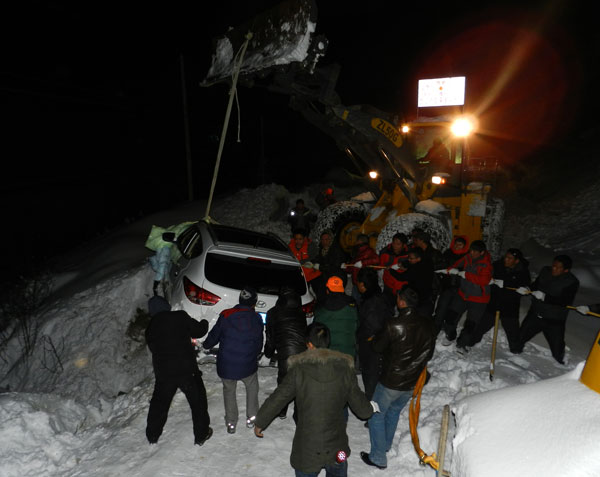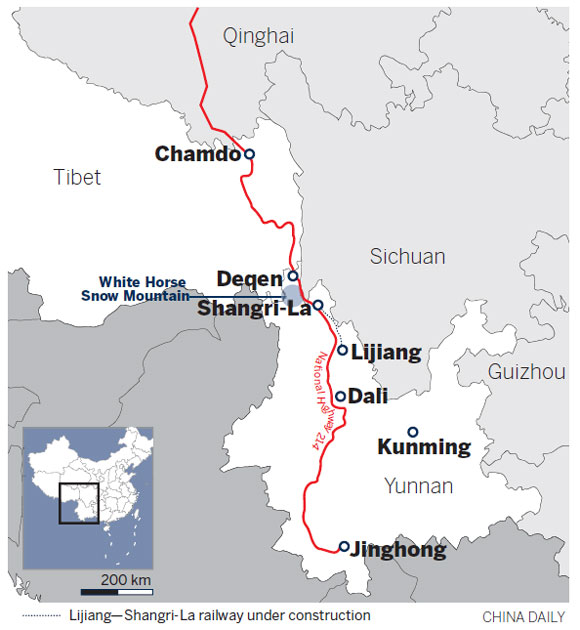Keeping open the lifeline to Tibet
Updated: 2013-10-28 07:38
By Hu Yongqi and Li Yingqing in Deqen, Yunnan (China Daily)
|
||||||||
A lifeline for locals
Chen Qun, director of the Diqing Bureau of Transport, said the Yunnan-Tibet Highway is a lifeline, crucial to the economic development of this eastern area of Tibet.
 |
|
This 2012 photo shows workers moving a car that was trapped by a snowstorm on the high-altitude highway. Provided to China Daily |

Every year, thousands of trucks travel the highway, carrying supplies to Chamdo, a major transport hub in the east of the autonomous region. Tibet is unable to produce commodities such as concrete, iron or steel and also lacks coal deposits or oil reserves. That means every truckload of supplies is vital to local residents, according to Zhou Yongbing, a 36-year-old driver who has been traveling the road for around a decade.
An official in Deqen county, who asked not to be named, said the poor transport facilities mean some villagers haven't left the area for three or four years and, in an place surrounded by mountains and hills, the highway has great significance for local residents.
Following an unexpected snowstorm in Deqen in early October, the larch trees on White Horse Snow Mountain turned from green to yellow, glowing golden in the sunlight that locals describe as "spicy" in their dialect. The thousands of hectares of larches looked like a sandy beach, embellished with evergreen plants against a background of snow-capped mountains.
The clean air and blue skies are welcoming and refreshing to people traversing the highway. On sunny days, the 6-meter-wide road is often blocked as people in cars and on motorbikes and bicycles pull over to take in the stunning scenery.
When the weather conditions deteriorate, however, there are few sightseers because drivers are far too concerned about the potential dangers along the zigzag highway to appreciate the natural beauty of the area.
"The scenery along the highway is famous, and a large number of visitors drive or just walk along the road to view it," said Chen. "So the safety of the road is of paramount importance."
On Oct 18, travelers stuck out their thumbs, hoping to hitch a ride from the passing vehicles for "cheap, but independent, travel" from Yunnan to Tibet. Some even said they were trying to get to Nepal and India.
Tanzen, director of the Social and Economic Institute at the China Tibetology Research Center in Beijing, said the highway is crucial to the economies of Diqing and other areas in the east of the autonomous region. "Tibet has many indigenous products that are precious to outsiders, but that means nothing without highways like the one that runs from Diqing," he said.
The work of the maintenance crews maintains a link with the outside world. It helps to widen the horizons of the Tibetans and people from other ethnic groups and enables them to take well-paid jobs in neighboring areas, he said.
"The giant trucks and the bitter cold of winter do severe damage to the highway, so the repair and maintenance work is unimaginably valuable," said Zhou.

 Serena completes dominant season with triumph
Serena completes dominant season with triumph
 Nuclear submarine fleet comes of age
Nuclear submarine fleet comes of age
 5 pharmacies begin to sell baby formula
5 pharmacies begin to sell baby formula Mother and four children stabbed to death in New York
Mother and four children stabbed to death in New York
 China Fashion Week S/S 2014: day 2
China Fashion Week S/S 2014: day 2
 Demonstrators protest against govt surveillance in US
Demonstrators protest against govt surveillance in US
 Where art thou, my love?
Where art thou, my love?
 Li Na reaches WTA Championships final
Li Na reaches WTA Championships final
Most Viewed
Editor's Picks

|

|

|

|

|

|
Today's Top News
High speed versus history
Southern states gear up for symposium
Film finds a hip-hop-tai chi connection
Jewelry exhibit dazzles Southern California
Obama aware of spying on Merkel: German paper
Five stabbed to death in NYC
Forum urges stable China-Japan ties
NSA spying hurts US diplomacy
US Weekly

|

|






